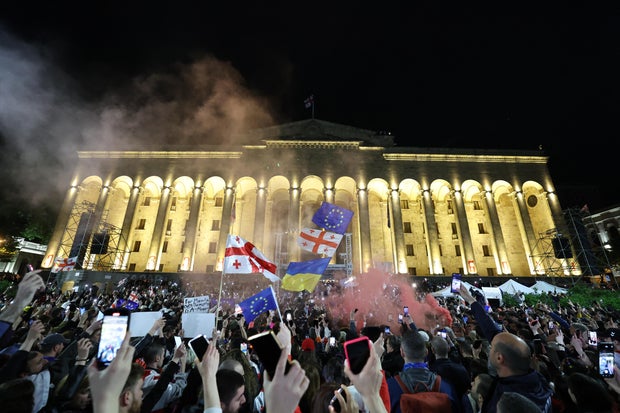The Georgian parliament approved a law that critics see as a threat to media freedom and the country’s aspirations to join the European Union – and a step towards the kind of draconian laws that have stifled political dissent in neighboring Russia.
By supporting the so-called “foreign agent” law, Georgia’s lawmakers defied weeks of massive demonstrations in the capital against the legislation, which also saw thousands of people vent their anger at Russia.
Tens of thousands of protesters closed a major intersection in the Georgian capital Tbilisi on Tuesday, Reuters reported, and protests again on Wednesday gathered in front of parliament.
The law will be sent to the president before it can come into force, and President Salome Zourabichvili – increasingly at odds with the ruling party – has promised to veto it, but the ruling Georgian Dream party has enough of a majority to override her veto.
Below is a look at the divisive law and why there is so much angst over it.
What the “foreign agent” law does?
The law would require media outlets, non-governmental organizations and other non-profit organizations to register as “advocating the interests of a foreign power” if they receive more than 20% foreign funding.
GIORGI ARJEVANIDZE/AFP via Getty Images
The law is almost identical to one that the ruling Georgian Dream party was pressured to withdraw last year following similar protests. This version passed the third and final reading in parliament on Tuesday.
The ruling party says the law is necessary to curb what it considers to be harmful foreign influence on Georgia’s political scene and prevent unidentified foreign actors from trying to destabilize it.
The opposition denounces it as “Russian law” because Moscow uses similar legislation to stigmatize independent media outlets and organizations critical of the Kremlin. Opposition lawmakers accused the ruling party of trying to drag Georgia into Russia’s sphere of influence.
What are Georgia’s relations with Russia?
Russia-Georgia relations have been tense and turbulent since the collapse of the Soviet Union in 1991 and Georgia’s exit from its role as a Soviet republic.
In 2008, Russia fought a brief war with Georgia, which had made a failed attempt to regain control over the breakaway province of South Ossetia. Moscow then recognized South Ossetia and another breakaway province, Abkhazia, as independent states and reinforced its military presence in those locations. Most of the world still considers both regions to be parts of Georgia.
Tbilisi has severed diplomatic relations with Moscow and the status of the two regions remains a key irritant, despite relations between Russia and Georgia having improved in recent years.
The opposition United National Movement accuses Georgian Dream, founded by Bidzina Ivanishvili, a former prime minister and billionaire who made his fortune in Russia, of serving Moscow’s interests – an accusation the ruling party denies.
What is the EU’s position?
EU foreign policy chief Josep Borrell described the parliament’s decision as “a very worrying development” and warned that “the final adoption of this legislation would have a negative impact on Georgia’s progress on its path to the EU”.
Borrell previously said the law was “not in line with EU fundamental norms and values” and would limit the ability of the media and civil society to operate freely.
European Council President Charles Michel said after the law was passed that “if they want to join the EU, they must respect the fundamental principles of the rule of law and democratic principles.”
























